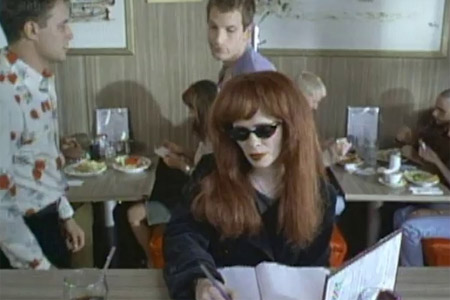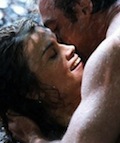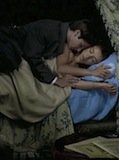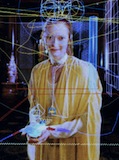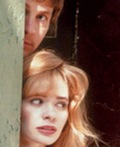As 2012′s celebrations of women’s history month draw to a close, we take a moment to salute the contributions of female auteurs in the second of three installments. Often marginalized in “official” histories of cinema, women have been integral in shaping cinema from practically the moment of its inception, proving themselves in the creative and social vanguard of their times—some only properly recognized in retrospect. From Alice Guy’s development of some of the conventions of narrative cinema to Maya Deren inspiring generations of boundary-pushing experimenters to Agnès Varda helping kick off the French New Wave, female auteurs have shaped larger film movements, styles, and trends.
Claire Denis
Maren Ade
Agnès Varda
Su Friedrich
Kelly Reichardt
Pascale Ferran
Chantal Akerman
Lynn Hershman Leeson
Adrienne Shelly
Julie Dash
Marjorie Keller
Dana Plays
Ida Lupino
Maya Deren
Ruth Ann Baldwin
Alice Guy
This list (in its full form, right) is not intended to be definitive in any way, and just as is the case with any list, the worthy-but-excluded far outnumber the comparatively tiny number of inclusions. A shortage of female filmmakers of color and/or of non-Western origin may indicate that if female filmmaking practice is often marginalized in general, those making films outside of America and Europe face even more hurdles in getting their films made, seen, available, and appreciated. Please feel free to submit your own overlooked favorites in the comments section: Germaine Dulac, Leni Riefenstahl, Lina Wertmüller, Barbara Hammer, Jane Campion, Mira Nair, Sofia Coppola? The list is potentially endless.
This particular collection is intended to be generative in nature, to inspire further exploration and study. Below is the second installment, featuring the films and the work of filmmakers available to view here at Fandor and arranged in reverse chronological order according to the featured film’s release date.
6. Pascale Ferran (1960–)
Ferran began her career working as an assistant in television and as a screenwriter on films, most notably on early films by Arnaud Desplechin and Mathieu Amalric. In 1994 Ferran directed Petits arrangements avec les mortise (Small Arrangements with the Dead), her first feature film. The film was widely acclaimed, and was awarded the Golden Camera at the Cannes Film Festival. After directing another critically acclaimed film the following year, Ferran was unable to make a film for over a decade. But the response of the film that eventually resulted, Lady Chatterley (2006), was an immediate and resounding critical success. Kevin B. Lee recently made a video essay for Keyframe beautifully illustrating the film’s unique visual and sensual sensibilities. The film went on to sweep the César Awards—France’s equivalent to the Academy Awards—winning in numerous categories, including Best Picture, Best Cinematography and Best Actress. Though Ferran was beat out in the Best Director category, she did pick up an award for the screenplay. While at the podium accepting one of her awards Ferran raised eyebrows by taking the occasion to address issues and problems in the French film industry, particularly in regard to the funding of film production. To date there has been no news of any post-Lady Chatterley projects, but one hopes it doesn’t take another decade before the release of the next Pascale Ferran film.
7. Chantal Akerman (1950–)
For over four decades now Chantal Akerman has been regarded as one cinema’s foremost filmmakers. The formalist rigor of her 1975 film Jeanne Dielman, 23 Quai du Commerce, 1080 Bruxelles (1975) was considered a landmark breakthrough in feminist filmmaking practice, and Akerman followed it up with a number of films utilizing a diverse range of styles and approaches to examine the complexities of women’s issues, including female sexuality, lesbianism, and mother/daughter relationships. Ever the iconoclast, she is famous for resisting what she regards as the inherent ghettoization of labels such as “female filmmaker” and “lesbian filmmaker,” a position that surfaces in her work through constant experimentation and innovation that resists quick and easy categorization. Her erotically-charged Proust adaptation, La captive (2000), is indicative of a more recent move toward innovative film adaptations, something that culminates in her most recent film, Almayer’s Folly (2011), which she discusses at length in an interview with Michael Guillén here at Keyframe.
8. Lynn Hershman Leeson (1941–)
Throughout her career as a filmmaker and artist, Hershman Leeson’s work has explored the complex relationship between humans and technology, and she is considered a pioneer in computer and web-based art. Though she has numerous films and video credits to her name, her most famous films to date are her films starring Tilda Swinton, Conceiving Ada (1997) and Teknolust (2002). In the former, Swinton plays Lord Byron’s daughter Lady Ada Lovelace, a mathematical and technological genius who developed an algorithm that is now considered a direct precursor to computers, and the film involves a 20th century computer scientist who attempts to communicate directly with Ada via technological and medical means. Like much of Hershman Leeson’s work, Conceiving Ada has a strongly feminist bent, an aspect of her work she discusses in the interview she gave to Keyframe. Explore more of Hershman Leeson’s extensive and fascinating body of work at her website, lynnhershman.com.
9. Adrienne Shelly (1966–2006)
Shelly began her film career in film as an actress, achieving her first major successes as the lead in Hal Hartley‘s The Unbelievable Truth (1989) and Trust (1990). But it was with the 1996 Shelly established herself as an impressive triple threat, writing, directing and starring in the zany and witty Sudden Manhattan (1997), an offbeat, Hartley-esque comedy revolving around a woman who struggles to make sense of her life—and gain some control over its more unwieldy aspects—after being fired from her job. Several years later Shelly wrote and directed the Ally Sheedy-starring I’ll Take You There (1999), but it was with the success of 2007’s bittersweet comedy Waitress that Shelly seemed poised for a major critical and commercial breakthrough. It was not meant to be: Just three months before the film’s debut she was found dead in her West Village apartment, brutally murdered after she caught a construction worker in the act of robbery. She was only 40 years old, meaning that Sudden Manhattan and Waitress stand as testament to a potentially major talent that we lost much too soon.
10. Julie Dash (1952–)
In 1991, Julie Dash’s Daughters of the Dust (1991) became the first full-length film by an African American woman to receive a general theatrical release in the United States. Initially rejected by Hollywood executives as being “too different” to warrant funding, Dash found alternative, non-mainstream means to make her film, and the meditative, multi-generational drama centering around a black family living in the South was immediately hailed as a cinematic landmark upon its release. Since its release, the film received particular attention and acclaim by feminist film scholars and theorists, inspiring a great deal of critical analysis and writing. In 2004 the film was inducted into the National Film Registry. But several decades before making Daughters of the Dust, Dash had come to attention through her association with the “L.A. Rebellion,” the name given to a group of young African American filmmakers studying at UCLA and making innovative films centered around African American experiences. For further information on the L.A. Rebellion as well as Dash’s work after Daughters of the Dust, check out Brandon Harris’s insightful interview with Dash recently published here at Keyframe.
Jesse Ataide writes for Keyframe and his blog Memories of the Future.

